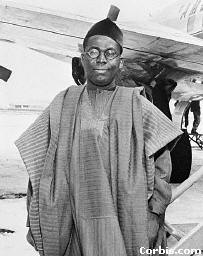
Posted by Webby on

Chief Obafemi Awolowo, leader of the banned Action Group and leader of the Yorubas of western Nigeria, was born on March 6, 1909. Son of a farmer and self made man, Chief Awolowo was educated at Anglican and Methodist schools in Ikenne, his home town, and at Baptist Boys' High School in Abeokuta, Western Nigeria. His education being curtailed from lack of money, Chief Awolowo worked as a pupil teacher and then went to Wesley College in Ibadan, the then capital city of Western Nigeria, to attend a course in teacher training. Leaving Wesley College, he studied shorthand and typing, and after working for a while in Lagos, returned to Wesley College in 1932 as a clerk.
Two years later, he became a trader and a newspaper reporter. He organized in the late '30s the Nigerian Produce Traders Association and became secretary of the Nigerian Motor Transport Union.
Not satisfied with his education, Chief Awolowo took up part-time studies and, after matriculation in 1939, went on to obtain a Bachelor of Commerce degree in 1944; in that year he was also editing the now defunct Nigerian Worker. In June 1940, he became secretary of the Ibadan branch of the Nigerian Youth Movement ( NYM )and, in this position , led the agitation for the reform of the Ibadan Native Authority Advisory Board in 1942.
He was CO-founder of the Trade Union Congress Of Nigeria in 1943. The following year, he went to London to study law and founded the Egbe Omo Oduduwa, a Yoruba tribal society. After qualifying in 1947, he returned to Nigeria to set up legal practice and continued to work for the Egbe Omo Oduduwa, becoming general secretary in 1948. Two years later he became moving spirit in organizing with other Yoruba leaders the Action Group, which won the then Western Region elections in 1951.
Chief Awolowo was a leader of Government Business and Minister of Local Government from 1951-54 when, with the introduction of the new Constitution, he became the first Premier of Western Nigeria. Chief Awolowo, who is highly competent, full of initiative, original in thought, practical and very often stubborn when he his convinced about something, built the Action Group into what was then described as 'the best political party south of the Sahara'.
With an able and efficient team, both in Government and in making the Western Region the cynosure of the rest of the Federation of Nigeria. He resigned the premiership of Western Nigeria in 1959 to contest the Federal elections but, failing to win, became the leader of the opposition in the Federal House Of Representatives. Chief Awolowo led his party's delegation to the London Constitutional conferences in 1953 and 1954, and to a later conference in Lagos in 1958.
So excellent was the administration of the Western Nigeria during Chief Awolowo's tenure in Office as Premier that when in 1953 the British Government announced its intention to grant self-government in 1956 to any Region desiring it, the Action Group Leader asked for and secured it in the same year.
Chief Awolowo is an unyielding advocate of a federal constitution for Nigeria. He is also a strong antagonist of the North's feudal system and its spread to other parts of Nigeria; an advocate of the creation of more states in Nigeria.
A fight broke out in the Western House of Assembly (May 25, 1962 ) following an attempt by the Action Group to discipline Chief Awolowo's next in command, the late Chief Samuel Akintola, who was then Premier of the Region. The Federal Parliament met four days later and decided to declare a state of emergency all over the region. Chief Awolowo and the main leaders were put under restriction, but later the Action Group Leader and some of his aides were detained following the discovery of a plot to overthrow the Federal Government.
On November 2, 1962, Chief Awolowo and 28 other members of his party were put on trial for treasonable felony. After a hearing lasting eleven months, he was sentenced (September 11, 1963) to ten years imprisonment, and, on appeal to the Federal Court the sentence was upheld.
He spent just over three years in calabar prison. He was released on August 3, 1966 with a state pardon. Nine days later, amid jubilation he was unanimously elected leader of the then 10,500,000 Yorubas and leader of the Western delegation to the All Nigerian Conference on the future association of Nigeria.
Chief Awolowo was married and has four children. While he was on trial, his eldest son, a Cambridge law student, died in a car accident near Ibadan.
Chief Awolowo was an author whose publications include Path to Nigerian Freedom, Thoughts on the Nigerian Constitution (which he wrote while in prison,he advocated a confederal constitution as the only way out of the impasse in Nigeria).